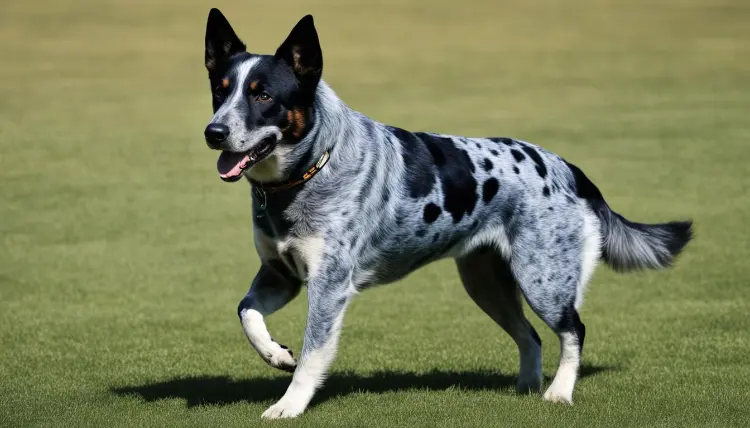What Type of Dog Food Is Best for a Goldendoodle?

What Type of Dog Food Is Best for a Goldendoodle? Choosing the right dog food for your goldendoodle isn’t just about filling their bowl. This breed has unique needs, thanks to its hybrid of Poodle and golden retriever traits.
A well-balanced diet tailored to their energy levels, size, and potential sensitivities can support their coat, digestion, and overall health.
For more insights into maintaining your dog’s well-being, check out these nutrition tips to ensure your Goldendoodle thrives at every stage of life.
Table of Contents
Key Takeaways
When answering the question, “What type of dog food is best for a Goldendoodle?” there are a few essential points to keep in mind. The nutritional needs of this hybrid breed are unique, and understanding what they require can make all the difference in their long-term health and happiness. Let me break it down for you.
Prioritize Balanced Nutrition
Goldendoodles thrive on food that offers a well-rounded nutritional profile. A mix of high-quality proteins, healthy fats, and essential vitamins is key to keeping them energetic and happy. Since their Poodle lineage often comes with a sensitive stomach, it’s wise to consider easily digestible options with limited ingredients.
While grabbing the first “premium” bag off the shelf is tempting, make sure you’re buying food that caters to the breed’s activity level and size. This resource provides an in-depth guide to tailored nutrition for mixed breeds.
Know the Difference Between Dry and Wet Food
Dry kibble is a standard go-to, offering convenience and long shelf life. It can also help with dental health, reducing the risk of plaque buildup. On the other hand, wet food tends to have higher moisture content, which can benefit dogs prone to dehydration.
Some Goldendoodles may respond better to a combination of both, so don’t be afraid to experiment and see what works for your dog.
This comprehensive breed list provides a breakdown of the different foods suitable for various breeds.
Look for Omega-3 and Omega-6 Fatty Acids
Goldendoodles are famous for their soft, curly coats, but keeping that coat healthy often requires the proper nutrients. Foods rich in Omega-3 and Omega-6 fatty acids can improve coat condition, reduce shedding, and promote healthy skin.
Salmon-based dog foods or options supplemented with fish oil are good choices. Many Goldendoodle owners swear by this: scroll through discussions like this to see what others say.
Avoid Artificial Additives
Many dog foods contain fillers, artificial flavors, and preservatives. While these might make the food more appealing or cheaper, they can also contribute to allergies or digestive problems in Goldendoodles.
Opting for natural, whole-food ingredients is always the safer route. Sweet potatoes and brown rice are great carbohydrate sources that don’t spike blood sugar.
To explore clean ingredient dog food options for Goldendoodles, check out this article from Open Farm.
Consider Age-Specific Formulas
Goldendoodles have different needs at various stages of life. Puppies need nutrient-dense food to support their rapid growth, while adult and senior Goldendoodles benefit from weight management and joint support formulas.
Ensure the food you choose aligns with their life stage to avoid overfeeding or missing out on critical nutrients.
By considering these factors, you can ensure that your goldendoodle thrives on a properly balanced diet tailored to its unique needs.
Understanding Goldendoodle Nutritional Needs
Goldendoodles are an active and intelligent breed with specific dietary requirements that support their unique characteristics.
A well-balanced diet tailored to their needs is essential for maintaining their energy levels and ensuring their iconic curly coat stays shiny and healthy.
Here’s a closer look at what makes their nutritional needs stand out.
High-Quality Protein for an Active Lifestyle
Goldendoodles are bundles of energy, thanks to their mix of Golden Retriever and Poodle genetics.
High-quality protein is the cornerstone of their diet, supporting muscle growth, repair, and overall physical health.
Whether on a brisk walk or chasing a frisbee, protein is their primary fuel source.
Proteins like lean chicken, turkey, and fish are ideal for their active lifestyle. Aim for dog food that lists an animal protein first on the ingredients label.
This ensures your goldendoodle gets what it needs to stay strong and agile. For more on how essential protein is for active dogs, check out this Goldendoodle Feeding Guide.
Healthy Fats for Coat and Skin Health
The soft, wavy coat of a goldendoodle is one of its standout traits, but it requires proper care—and nutrition plays a key role in that. Omega-3 and Omega-6 fatty acids help maintain their coat’s softness and shine while keeping their skin healthy. These healthy fats also reduce inflammation and support cognitive function.
Foods rich in fish oil, flaxseed, or chicken fat are excellent sources of these fatty acids. If your dog’s coat starts to feel dull or their skin becomes flaky, they might not get enough nutrients.
You can also explore more insights on coat health in this Doodle Diet & Nutrition guide.
Balanced Carbohydrates for Sustained Energy
Complex carbohydrates are essential for providing Goldendoodles with long-lasting energy. While they don’t need excessive carbs, the right amount can keep them energized throughout the day without adding unnecessary weight.
Ingredients like brown rice, barley, and sweet potatoes are great options.
Avoid foods packed with fillers like corn or wheat, as these provide little nutritional value and can contribute to weight gain. Keeping carbs balanced ensures your pup stays active without facing the risks of obesity-related health issues.
For additional information on diet balance, this Raw Feeding Guide offers some helpful pointers.
Essential Vitamins and Minerals
Goldendoodles benefit from a diet enriched with essential vitamins and minerals. Calcium and phosphorus are crucial for strong bones and joint support, especially in larger goldendoodles. Vitamins like A, E, and D promote eye health, immunity, and overall development.
Leafy greens, berries, and root vegetables often found in high-quality formulations are great natural sources of these nutrients. A diet rich in these elements helps protect against common health issues and keeps your Goldendoodle thriving.
For more on maintaining your pup’s overall wellness, visit this Health & Nutrition For Goldendoodles.
Focusing on these key areas of goldendoodle nutrition can help ensure your four-legged friend stays healthy, active, and full of life.

Photo by Mia Anderson
Types of Dog Food for Goldendoodles
Goldendoodles are adorable bundles of energy with diverse dietary needs. Like all dogs, they can thrive on different types of food, and your choice should depend on their age, activity level, and health needs.
Below, I’ll share the main types of dog food available and how each might best suit your Goldendoodle.
Dry Kibble
Dry kibble is probably the most popular choice for many pet parents, and good reason. It’s convenient, has a long shelf life, and is often budget-friendly.
But many high-quality kibble options are also specifically formulated to support a dog’s overall health, from improving coat shine to supporting weight management.
One standout perk of kibble is its ability to help with dental hygiene. The crunchy texture naturally reduces plaque buildup, keeping those pearly whites healthy. Plus, kibble makes it easier to measure portion sizes, helping you avoid overfeeding your pup.
For Goldendoodles, especially active ones, look for kibble with protein as the first ingredient. Brands incorporating Omega-3 and Omega-6 fatty acids can help keep their curly coats looking their best. If you’re wondering which kibble might suit your dog, here’s a guide covering the best dog foods for Goldendoodles.
Wet Food
Wet food can be an excellent option in specific scenarios. It’s rich in moisture, making it a lifesaver for dogs who don’t drink enough water or need additional hydration support. Goldendoodles are prone to urinary tract issues or dehydration, and they may significantly benefit from it.
Another reason to consider wet food? It’s often more appetizing to picky eaters. If your dog ignores their bowl during meals, wet food—or even mixing it with kibble—can make mealtime more exciting.
I’ve noticed this is particularly helpful with senior dogs or those with dental problems, as canned food is softer and easier to eat. Check out how wet food options, like those tailored for senior dogs, balance flavor and function in this Purina Pro Plan food review.
Raw and Homemade Diets
Raw and homemade diets have gained popularity and offer unique benefits. A high-quality raw food diet typically includes uncooked meats, bones, and fresh vegetables, mimicking what dogs might eat in the wild.
Some Goldendoodle owners swear by this approach for improving coat health and reducing allergies. However, raw diets must be adequately balanced to avoid nutritional deficiencies.
Homemade diets also give you control over what goes into your dog’s meals, which is ideal for pups with food sensitivities. While preparing meals at home allows for tailored nutrition, getting the right balance of nutrients requires time, education, and effort.
An imbalance can lead to long-term health issues, so if you choose this route, consult a veterinary nutritionist.
While raw or homemade diets can be beneficial, they come with challenges—cost, preparation time, and potential bacterial risks. If you’re considering this option, resources like the American Doodle Registry’s food guide offer helpful insights into making an informed decision.
Each dog is unique, and you might find that your Goldendoodle thrives on a mix of these options. Just remember to prioritize balanced nutrition regardless of the type of food you choose.
Common Dietary Concerns for Goldendoodles
Goldendoodles are a charming blend of Golden Retrievers and Poodles, inheriting unique dietary needs and potential sensitivities from both parent breeds. Keeping their diet balanced and tailored is essential, as they are prone to conditions like allergies, digestive issues, or even weight management challenges.
In this section, let’s explore specific concerns and solutions.
Managing Food Allergies and Sensitivities
Like many hybrid breeds, Goldendoodles can develop sensitivities to certain ingredients over time. Signs of food allergies may include excessive scratching, ear infections, diarrhea, or a dull coat. Identifying these allergens early can save your pup from discomfort and serious issues.
To pinpoint potential triggers:
- Eliminate suspect foods: Try an elimination diet, feeding your dog a single protein and carbohydrate source for 8-12 weeks.
- Consult a veterinarian: Vets often recommend hypoallergenic dog food or prescription diets to avoid common allergens.
When introducing new food, always do it gradually. Mix the new food with the old in increasing ratios over 7-10 days to prevent upset stomachs. Additionally, if your dog shows persistent symptoms, discuss allergy testing with your vet.
This Goldendoodle Feeding Guide offers more insights into how proper nutrition helps manage allergies.
Avoiding Common Ingredients That May Cause Problems
Some ingredients in dog food do more harm than good, particularly for Goldendoodles. Certain fillers and artificial additives can lead to digestive discomfort or long-term health concerns. What should you look out for?
- Corn, soy, or wheat fillers provide little nutritional value and may trigger allergies. They’re often included in cheaper dog foods to bulk up the product.
- Artificial colors and flavors: These are entirely unnecessary in dog food and have been linked to hyperactivity and allergic reactions in some dogs.
- By-products: These low-quality ingredients could contain anything from feathers to hooves—not precisely what you want to feed your dog.
Instead, look for foods with whole, natural ingredients like sweet potatoes, brown rice, and real meat. These options are easier on the stomach and provide long-lasting energy and better overall health. For more tips, explore this detailed resource on Doodle Diet and Nutrition.
How Age and Size Affect Dietary Choices
Goldendoodles come in various sizes—mini, Medium, and Standard—and each has different energy and nutritional requirements. Likewise, age plays a crucial role in dietary needs.
- Puppies require food rich in calories, proteins, and essential minerals to support their rapid growth. Puppy formulas are explicitly tailored to meet these needs.
- Adult Goldendoodles benefit from balanced formulas with moderate protein and fat levels, depending on their activity level.
- Seniors need foods geared toward joint health, such as those fortified with glucosamine and chondroitin, and lower calories to prevent weight gain.
Don’t miss these nutrition tips for a more personalized approach to feeding your goldendoodle based on its age and size.
Attending to these dietary concerns can go a long way in ensuring your Goldendoodle thrives. Healthy choices today mean fewer issues and a happier, tail-wagging companion by your side.
How to Pick the Best Dog Food for Your Goldendoodle
Picking the right food for your Goldendoodle can feel like navigating a maze of options. With flashy packaging, long ingredient lists, and numerous claims of “premium quality,” it’s no surprise many dog owners feel overwhelmed. The good news?
There are a few straightforward guidelines to help you choose what type of dog food is best for a Goldendoodle so they thrive both inside and out.
Evaluating Ingredients and Nutritional Profiles
The first step to picking the right food for your Goldendoodle is understanding the ingredients list. While marketing labels can be persuasive, remember that they don’t always reflect the quality of what’s inside. Here’s how to ensure you’re choosing a nutritionally sound option:
Prioritize quality proteins: Look for dog food with a named protein source as the first ingredient, such as chicken, lamb, or salmon—these fuel your Goldendoodle’s active lifestyle. Avoid generic terms like “meat meal” or “animal by-products.”
Check for whole grains or healthy carbs: Ingredients like brown rice or sweet potatoes provide steady energy, while fillers like corn, soy, or wheat often contribute only empty calories.
Essential fats and oils: Omega-3 and Omega-6 fatty acids are crucial for Goldendoodles to maintain their iconic curly fur and healthy skin. Foods enriched with fish oil or flaxseed are excellent choices.
- Avoid artificial additives: Avoid artificial colors, flavors, and preservatives. These can stress your dog’s digestive system and are usually unnecessary fillers.
This Doodle Diet & Nutrition Guide might help you better understand what your dog food label really means. A little knowledge can go a long way toward making informed decisions.
Considering Activity Levels and Lifestyle
Goldendoodles come in different sizes and activity levels, influencing their nutritional needs. Are you and your pup active hikers, or is your dog more of a couch companion? Activity levels should directly impact how you choose their food.
- If your dog gets daily exercise and has a high energy level, look for foods rich in protein and fats to fuel their stamina.
- For more sedentary Goldendoodles, focus on foods with balanced fats and moderate calories to prevent unnecessary weight gain. Weight management formulations can work well.
- Puppies and younger dogs have higher calorie needs than older, less active dogs. This Dog Food Advisor Guide offers brand recommendations tailored for specific stages.
Also, reflect on your lifestyle. If you prioritize convenience, high-quality kibble might be the best choice. Mixing kibble with wet food or transitioning to homemade diets is another option for those willing to put in extra effort.
Consulting with Your Veterinarian

While researching and labeling reading are essential, consulting your veterinarian is the best step to find the dog food that matches your Goldendoodle’s needs. Your vet is a trusted partner, offering advice backed by science and an understanding of your dog’s overall health.
A vet can provide tailored recommendations if your Goldendoodle:
- Has allergies or food sensitivities.
- Needs a controlled diet due to weight management or joint issues, especially in senior dogs.
- Requires additional supplements like glucosamine for joint health or probiotics for digestion.
For more insights into choosing the best food and consulting veterinarians, this guide on dog nutrition from The Honest Kitchen may also help.
By combining your observation with professional vet advice, you’ll be confident in selecting a healthy food that’s tailored to your goldendoodle’s unique personality and needs.
Frequently Asked Questions About Goldendoodle Diets
Goldendoodle owners often have many questions about feeding their playful and energetic pups. I’ve rounded up the most common queries to help you confidently choose the best dog food for your furry friend.
What type of dog food is best for a Goldendoodle?
Goldendoodles do well on high-quality dog food that balances protein, fats, and carbohydrates. Look for formulas that list a named protein, like chicken or salmon, as the first ingredient. Omega-3 and Omega-6 fatty acids are essential for maintaining soft, curly coats and healthy skin. For a detailed breakdown of recommended food options, visit this Dog Food Advisor resource.
Should I consider breed-specific dog foods?
While “Goldendoodle-specific” dog food isn’t commonly marketed, foods designed for Poodles or Golden Retrievers often overlap in nutritional requirements. The key is to choose a diet that matches their size (Mini, Medium, or Standard) and activity level. Size and metabolism can influence what’s best, so ensure the portion size aligns with their needs.
How do I know if my Goldendoodle has food allergies?
Common symptoms of food allergies in Goldendoodles include excessive itching, constant licking of paws, ear infections, or an upset stomach. If you suspect allergies, start with a limited-ingredient dog food and gradually introduce new options to identify potential triggers. Additionally, a vet-recommended hypoallergenic diet can help. Learn more with this informative guide.
Can I mix kibble with wet food?
Mixing kibble and wet food can offer the best of both worlds. Dry food is excellent for dental health and easy portion control, while damp food adds hydration and enhances flavor for picky eaters. When combining the two, ensure the daily calorie count meets your Goldendoodle’s nutritional needs. For further details on the best feeding approaches, check out this wet vs. dry dog food resource.
Is a grain-free diet better for Goldendoodles?
Grain-free diets benefit some dogs with grain sensitivities, but they’re not always necessary for Goldendoodles unless known intolerance exists. Whole grains like brown rice and oats can be excellent sources of energy and fiber. However, avoid foods loaded with fillers such as corn or wheat. You can explore specific recommendations for wholesome ingredients in this nutrition guide.
Addressing these FAQs can clear up any uncertainty and ensure your goldendoodle enjoys the best possible nutrition tailored to its unique needs. Stay tuned for additional insights to keep your pup happy and healthy.
Conclusion
Feeding your Goldendoodle the correct type of dog food isn’t just about meal prep—it’s about their overall well-being and happiness. A diet rich in high-quality proteins, balanced fats, and essential nutrients helps maintain their energy, digestion, and that famous curly coat.
By monitoring their unique needs, such as food sensitivities or energy levels, you can make informed choices that truly support their health. Explore these nutrition tips for additional insights on providing a balanced diet for your dog.
Remember, every Goldendoodle is one-of-a-kind. Reviewing ingredient labels, consulting your veterinarian, and adjusting as needed ensures your furry friend gets the best care possible. Because at the end of the day, every thoughtful choice you make for their meals directly adds to their joy and longevity.






